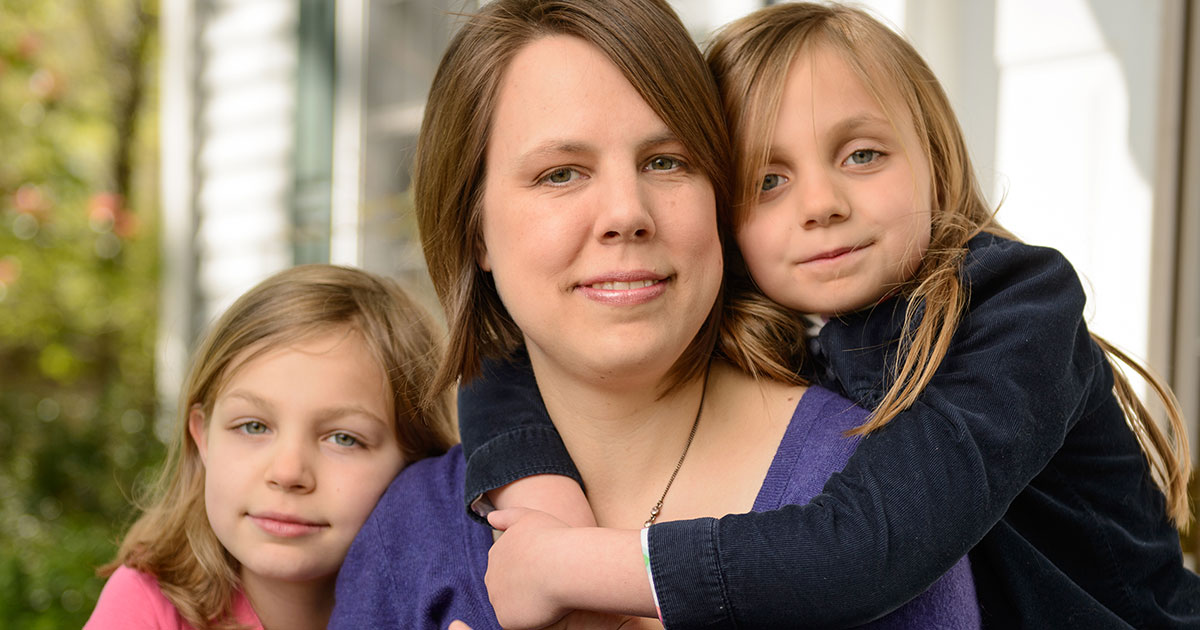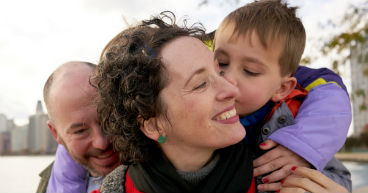
When a parent is diagnosed with cancer, the family life and the children’s daily routine are inevitably disrupted. It may be tempting to try to avoid talking to your children about cancer. You may feel that they’re too young to understand, and shielding them from the news will be better in the long run. But kids often sense when something is “off” with a loved one, and avoiding the situation may result in mistrust and fear at a time when children need to feel even more comfortable and secure in their surroundings.
Without proper information, children may:
- Feel anxious about the changes taking place
- Imagine something worse is going on than reality
- Believe that whatever is going on is too scary to talk about
- Feel as if they’re being punished
- Feel left out and isolated from the family
- Find it difficult to trust you when they do find out
Age matters
The way children deal with the emotions that come along with cancer often depend on the child’s age and development. Your child’s age, coping skills, constitution and level of maturity are important factors in determining how to approach the situation. Children of any age may regress or act younger when under stress. Their behaviors may become exaggerated for a period of time. For example, a 3-year-old may begin wetting the bed again or return to thumb sucking as a coping mechanism. Children who have problems paying attention in school may have even more difficulty concentrating than before.
Depending on their age group, children may handle a parent’s cancer diagnosis in these ways:
Small children are not old enough to understand the concept of cancer. They tend to focus on the cancer side effects they may see, such as hair loss. Young children also tend to believe they’re the center of the world. It’s common for them to assume they’re to blame for the cancer because of something they thought, said or did. They also fear separation and being left alone. Since small children are often unable to express how they’re feeling in words, you may get an idea about what’s going on by watching their behavior, including changes in their play. They may suddenly have fears of the dark, of monsters, animals or strangers. Nightmares and trouble sleeping may also develop.
School-aged children typically understand more and have a basic knowledge of the human body. They are more likely to need clear and simple explanations since they still don’t have the focus of adults. They may be disturbed by a change in the daily routine, and they may look for ways to help you. Children of this age may also be reluctant to discuss their feelings because they’re afraid of adding to a hardship. Upon hearing the news, they may go off to play and react later. School-aged children may feel anxiety, jealousy and separation anxiety. They may also suffer from poor concentration at school, which may result in poor grades.
Teenagers have likely heard about cancer and may want to know more detailed information about the disease. They may also be afraid to upset you by asking questions or bringing up your diagnosis. Teenagers present special challenges because of their need for independence and space. They may feel guilty about wanting to get away when they feel they should be at home. They also tend to have complicated emotional swings. They may feel it’s childish to show their feelings at a time when they want to appear grown up. They often want to be more independent and treated like an adult. They may end up feeling angry, rebellious, depressed, withdrawn and apathetic.
Maintaining normalcy
One important way to help children cope when a parent has cancer is to maintain family time and change their routine as little as possible. Since children rely on structure, trying to keep their lives “normal” may help them feel more secure.
It’s also important not to treat cancer as a family secret, says David Wakefield, PhD., Psychologist at Cancer Treatment Centers of America® (CTCA), Tulsa.
“Let your children know that it’s OK to talk to other important people in their life about cancer. Your children may ask questions and share their feelings with members of their support network,” says Dr. Wakefield. “You may want to contact these people in advance to give them the appropriate information and ask them to be sensitive to your children’s needs.”
You may encounter times when you don’t know what to say. It’s understandable that you may not be prepared for every situation. Although cancer is disruptive and overwhelming, it doesn’t change the fact that you know your children best. Trust your judgment about how to support them during this difficult time.
Tips to help a child cope with a parent’s cancer
Dr. Wakefield recommends making communication a priority. Make sure you not only talk about cancer, but about other things going on in the child’s life as well. He offers this additional advice:
Let your kids ask questions. They may overhear you talking to others, and if they aren’t able to ask about what they’ve heard, they may invent their own explanations.
Take the opportunity to communicate. Always give them accurate information they will understand. This will more likely help them feel more comfortable and in the know.
Be honest and maintain trust. It’s OK if you don’t know the answer to their questions. It may be something you discover together.
Explain how cancer may affect you or them. Prepare them for changes that might occur, such as hair loss or loss of energy. Assure them that their needs will still be met despite these changes.
Ask them what they know. You may assume younger children don’t have a good grasp on what cancer is, but you may be surprised as to how much they’ve picked up. This also allows you to clear up misinformation they may have heard from others.
Show your love and affection. Let them know that their needs are still very important to you. Explain that your health may have changed, but your love hasn’t.
Listen. Be prepared to listen to your child’s concerns and emotions. And in turn, express your feelings with them. This models that it’s ok to talk about how you feel.
Consider a counselor. Having your child speak with a professional may offer support to them as you go through treatment.
Offer reassurance: Make sure your children know that they did not cause your cancer. Explain that, sometimes, events happen in life that we cannot explain.
Alert others: Communicate with your children’s teachers and school counselors about your medical condition. They are in a better position to support them at school and also inform you if your child shows signs of significant changes in behavior or mood.



